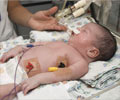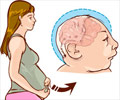Researchers at Stanford University have developed a method that might help give the results of pre-natal tests within just a few hours instead of two weeks
Researchers at Stanford University have developed a method that might help give the results of pre-natal tests within just a few hours instead of two weeks, thus making the early detection of Down syndrome and other birth defects that involve an abnormal number of chromosomes possible.
Scientists in California reported the advancement and the report has been published in Oct. 1, 2007 issue of ACS’ journal Analytical Chemistry.According to Stanford University bioengineering professor and Howard Hughes Medical Institute researcher Stephen R. Quake and his graduate student H. Christina Fan, the existing pre-natal tests depend on a technique termed karyotyping, which takes a lot of time to deliver the results.
It requires a two-week wait for anxious parents, while cells taken with amniocentesis or chorionic villus sampling are grown in laboratory culture and analyzed.
The study revealed that the new method produced accurate results within two hours. The test is a variation of the famed polymerase chain reaction (PCR) — the basis of the genetic engineering revolution, which produces thousands of identical copies of minute samples of DNA.
Using a technique known as the digital polymerase chain reaction, Quake and Fan replicated DNA from two cultures of cells growing in the laboratory. One consisted of a normal human cell line and the other had human cells with the Down variant. The digital PCR process allowed the researchers to count DNA molecules from the samples, substituting for the two-week cell culture process traditionally needed to produce enough DNA for karyotyping.
With the precision derived from counting individual DNA molecules, researchers then were able to move ahead without delay and determine which samples had the extra chromosome that indicates Down syndrome.
Rapid testing alternatives already exist, but they are either too labor-intensive or not applicable to the whole population. “The technique we present in this paper can overcome these limitations. It is rapid and simple. We estimate that the entire procedure from sample collection to result readout would take only a few hours, substantially reducing the anxiety of the expectant parents,” Quake said.
The next step is to begin clinical trials to evaluate the sensitivity and specificity of the new test. The authors believe the new test could be available in as little as one year.
In addition, Quake cited the possibility that the method could lead to a blood test for Down syndrome.
Source-ANI
LIN/C
 MEDINDIA
MEDINDIA
 Email
Email










